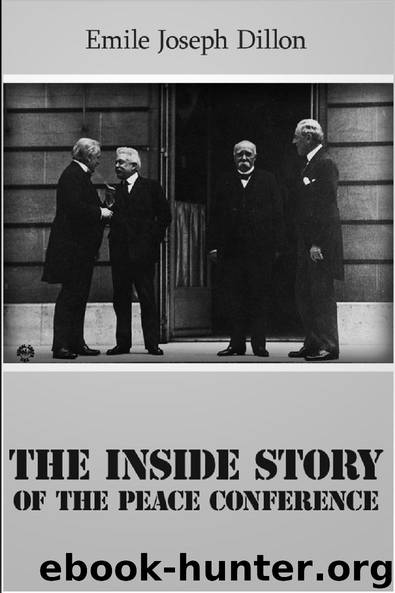The Inside Story of the Peace Conference by Emile Joseph Dillon

Author:Emile Joseph Dillon
Language: eng
Format: epub
Tags: book, books, history, first world war, world war one, treaty of versailles, paris, league of nations, united nations, un
ISBN: 9781781668580
Publisher: Andrews UK Limited 2012
Published: 2012-06-20T00:00:00+00:00
VII
POLAND'S OUTLOOK IN THE FUTURE
Casting a parting glance at Poland as she looked when emerging from the Conference in the leading-strings of the Great Western Powers, after having escaped from the Bolshevist dangers that compassed her round, we behold her about to begin her national existence as a semi-independent nation, beset with enemies domestic and foreign. For it would be an abuse of terms to affirm that Poland, or, indeed, any of the lesser states, is fully independent in the old sense of the word. The special treaty imposed on her by the Great Two obliges her to accord free transit to Allied goods and certain privileges to her Jewish and other minorities; to accept the supervision and intervention of the League of Nations, which the Poles contend means in their case an Anglo-Saxon-Jewish association; and, at the outset, at any rate, to recognize the French generalissimus as the supreme commander of her troops.
Poland's frontiers and general status ought, if the scheme of her French protectors had been executed, to have been accommodated to the peculiar functions which they destined her to fill in New Europe. France's plan was to make of Poland a wall between Germany and Russia. The marked tendency of the other two Conference leaders was to transform it into a bridge between those two countries. And the outcome of the compromise between them has been to construct something which, without being either, combines all the disadvantages of both. It is a bridge for Germany and a wall for Bolshevist Russia. That is the verdict of a large number of Poles. Although the Europe of the future is to be a pacific and ethically constituted community, whose members will have their disputes and quarrels with one another settled by arbitration courts and other conciliatory tribunals, war and efficient preparation for it were none the less uppermost in the minds of the circumspect lawgivers. Hence the Anglo-Saxon agreement to defend France against unprovoked aggression. Hence, too, the solicitude displayed by the French to have the Polish state, which is to be their mainstay in eastern Europe, equipped with every territorial and other guaranty necessary to qualify it for the duties. But what the French government contrived to obtain for itself it failed to secure for its new Slav ally. Nay, oddly enough it voted with the Anglo-Saxon delegates for keeping all the lesser states under the tutelage of the League. The Duumvirs, having made the requisite concessions to France, were resolved in Poland's case to avoid a further recoil toward the condemned forms of the old system of equilibrium. Hence the various plebiscites, home-rule charters, subdivisions of territory, and other evidences of a struggle for reform along the line of least resistance, as though in the unavoidable future conflict between timidly propounded theories and politico-social forces the former had any serious chance of surviving. In politics, as in coinage, it is the debased metal that ousts the gold from circulation.
Poland's situation is difficult; some people would call it precarious.
Download
This site does not store any files on its server. We only index and link to content provided by other sites. Please contact the content providers to delete copyright contents if any and email us, we'll remove relevant links or contents immediately.
| Africa | Americas |
| Arctic & Antarctica | Asia |
| Australia & Oceania | Europe |
| Middle East | Russia |
| United States | World |
| Ancient Civilizations | Military |
| Historical Study & Educational Resources |
The Radium Girls by Kate Moore(12028)
100 Deadly Skills by Clint Emerson(4925)
Rise and Kill First by Ronen Bergman(4789)
The Templars by Dan Jones(4689)
The Doomsday Machine by Daniel Ellsberg(4490)
The Rape of Nanking by Iris Chang(4213)
Killing England by Bill O'Reilly(4001)
Stalin by Stephen Kotkin(3965)
Hitler in Los Angeles by Steven J. Ross(3946)
12 Strong by Doug Stanton(3550)
Hitler's Monsters by Eric Kurlander(3343)
Blood and Sand by Alex Von Tunzelmann(3205)
The Code Book by Simon Singh(3189)
Darkest Hour by Anthony McCarten(3133)
The Art of War Visualized by Jessica Hagy(3007)
Hitler's Flying Saucers: A Guide to German Flying Discs of the Second World War by Stevens Henry(2754)
Babylon's Ark by Lawrence Anthony(2679)
The Second World Wars by Victor Davis Hanson(2524)
Tobruk by Peter Fitzsimons(2518)
